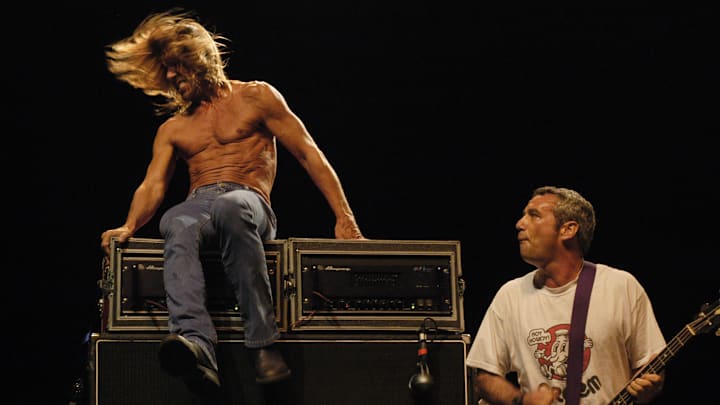Iggy & The Stooges is a rock band that originated in Ann Arbor, Michigan, in 1967. The band is known for its intense and energetic live performances and is considered a pioneer of proto-punk music (though I am fine with just calling them "punk rock" or simply "rock").
The group's frontman and perhaps primary creative force is Iggy Pop (sometimes called the "Godfather of Punk," real name James Osterberg), known for his wild stage presence, which included self-mutilation, and walking on a crowd while smearing his chest with peanut butter, and his raw, visceral vocals. The original lineup of The Stooges consisted of Pop, Ron Asheton (guitar), Dave Alexander (bass), and Scott Asheton (drums).
The Stooges albums
Their self-titled debut album, The Stooges, was released in 1969 and featured a raw and aggressive sound that set them apart from many of their contemporaries. Basically, their sound wasn't quite the "Aquarian Experience" of "Peace and Music” associated with Woodstock. It included tracks like "I Wanna Be Your Dog" and "1969," which typified so-called proto-punk. Their second album, Fun House (1970), continued in a similar vein, with a primal and unpolished sound, as did Raw Power (1973).
However, the band faced challenges related to drug abuse and internal conflicts, leading to their initial big breakup in 1974. Iggy Pop pursued a solo career, releasing classic albums like The Idiot, but in 2003, The Stooges reunited with Iggy Pop, Ron Asheton, Scott Asheton, and later additions James Williamson and Mike Watt. They released a new album, The Weirdness, in 2007, which was met with mixed reviews.
The Stooges and mortality
Tragically, Ron Asheton passed away in 2009, and The Stooges continued to perform with different lineups, until breaking up after Scott Asheton died of a heart attack in 2014 and saxophonist Steve Mackay died in October 2015. Their influence on the punk rock and alternative music scenes is undeniable, and they are celebrated as one of the foundational bands in the development of punk rock (technically pre-dating the "Gabba Gabba Hey"-day of the Ramones).
Look at it this way: This band was practically playing punk rock during the psychedelic '60s era of Jimi Hendrix (to be fair, Hendrix's "Purple Haze" and other tracks really helped introduce "alternative" elements to the rock world that hadn't really been popularized before, and it's not like Hendrix didn't himself convey sort of a punk rock spirit at times).
Iggy Pop: The head Stooge?
Iggy Pop remains a significant figure in the music industry and continues to perform and record as a solo artist. He released the album Post Pop Depression. In interviews throughout his career, Pop has relived the ups and downs of his rise to fame with The Stooges, as well as his subsequent collaborations with other artists, including David Bowie, Lou Reed, and Queens of the Stone Age.
There were surely some who heard The Stooges and though "This is a new music. There's an intensity to it." That same mood is conveyed by the very title of their album Raw Power, which was hugely influential on punk and alternative music (and probably metal as well).
